The effect of interleukin on the function of NK cells(IL-1β, IL-12, IL-15, IL-18, IL-21)
Natural killer cells originate from bone marrow lymphoid stem cells and are innate immune effector cells in the body. They are named after their non-specific cytotoxicity. The killing activity of NK cells is not limited by MHC and does not depend on antibodies, hence it is called natural killing activity. It kills tumor cells through direct dissolution and secretion of cytokines, making the development of its anti-cancer function a hot topic in cancer research in recent years.
Interleukins are a group of cytokines secreted by various types of cells that can regulate cell growth, differentiation, and immune activity. Most of them are closely related to NK cells, or directly participate in the regulation of NK cells, or indirectly regulate the function of NK cells by affecting other immune cells. Interleukins such as IL-2, IL-15, and IL-18 are considered factors that stimulate NK cells and are used for in vitro expansion of NK cells. They have a positive regulatory effect on the activation and differentiation of NK cells. The addition of these cytokines during in vitro culture can significantly enhance the killing activity of NK cells.1、Promoting NK cell expansion and activation: IL-2/21
Since 1996, Soffer RJ et al. have reported that low-dose continuous infusion and intermittent administration of IL-2 have a significant expansion effect on CD56+NK cells in patients with metastatic cancer. Most NK cells have affinity receptors for IL-2 on their surface, and IL-2 induces NK cytotoxicity in approximately 18-24 hours. In addition, IL-2 can also induce the proliferation of NK cells, which generally begins 3-4 days after stimulation. The mechanism is that IL-2 can induce the expression of IL-2R in NK cells α Chain, newly expressed α Chain and original cell surface β Chain and γ Chain binding forms high affinity receptors, which stimulate NK cell proliferation in the presence of IL-2.
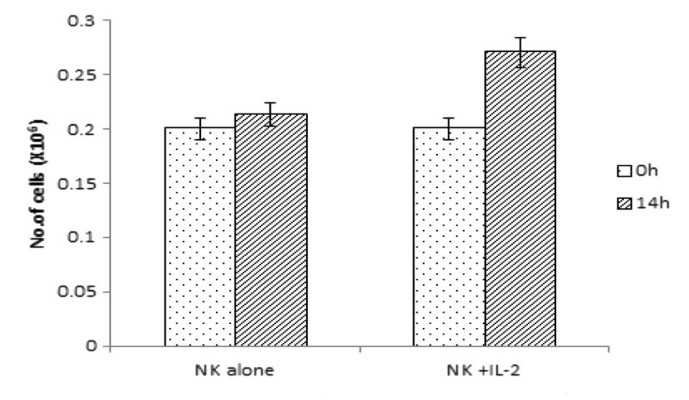
picture source: Sharma R, et al. Immunol Res. 2018
Wendt K et al. reported that in the regulation of NK cell function, IL-2 alone can promote the expansion of human NK cells, while the combination of IL-2 and IL-21 produces a more significant expansion effect.
Li Q et al. reported that IL-21 has a significant expansion effect on human NK cells cultured in vitro, with a concentration dependent increase in cell number. It also promotes the expansion of cells into the S phase of the cell cycle during the first two weeks of culture. It also promotes cells to enter the S phase of the cell cycle during the first to second week of cultivation.
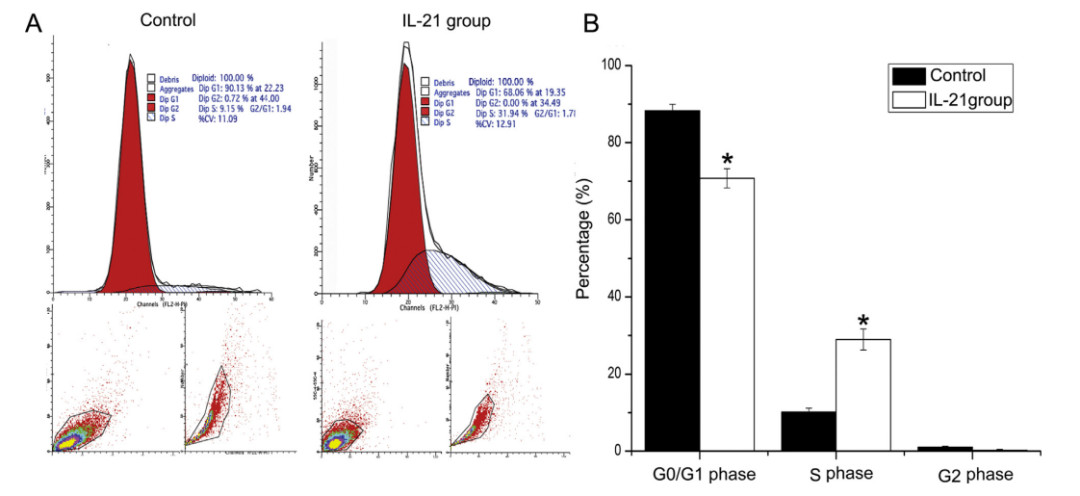
picture source: Li Q, et al. Immunobiology. 2015.
2.Inducing differentiation of NK cells: IL-1β/ 12/15
The immune phenotype of NK cells is CD3-CD56+, and it is currently mostly believed that they differentiate directly from bone marrow hematopoietic stem cells, that is, from CD34+hematopoietic stem cells. Numerous experiments have confirmed that CD34+cells derived from bone marrow can differentiate into NK cells in vitro through cytokine induction, providing another option for the source of NK cells.
Ambrosini et al. analyzed the effect of IL-1β on the differentiation of NK cells from umbilical cord blood CD34+precursor cells, and the data showed that IL-1β inhibits ILC3 while promoting the maturation of umbilical cord blood CD34+precursor NK cells.
Li Yan et al. conducted in vitro induction differentiation experiments on CD34+leukemia cells derived from bone marrow of patients with acute myeloid leukemia. CD34+leukemia cells can be induced to differentiate into NK cells in vitro which have cytotoxic activity. The combination of IL-12 and 1L-15 cytokines can induce differentiated NK cell activity, improve the killing rate of leukemia cells and the expression levels of TNF-α and IFN-γ genes.
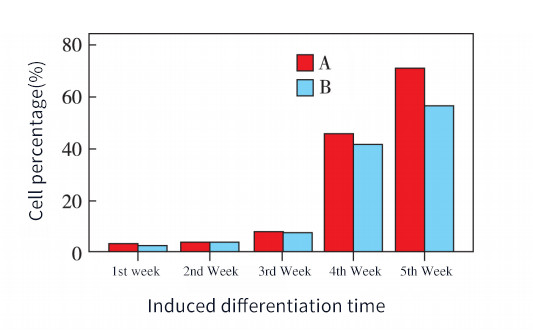
picture source: Li Yan et al. Journal of Clinical Oncology, 2019
3.Enhancing NK cell toxicity: IL-12/18/21
Guia et al. found that in patients with complete deficiency of IL-12Rbeta1 caused by IL12RB1 mutation, the NK cell subpopulation was significantly reduced, especially in the production of IFN-γ; Similar data was obtained from patients with complete loss of IL-12p40. In addition, the number of the effector memory T cell subpopulation expressing CD56 was significantly reduced in patients with IL-12Rbeta1 and IL-12p40 deficiency. Therefore, human NK cells require IL-12 in vivo to obtain its full spectrum of functional responsiveness.
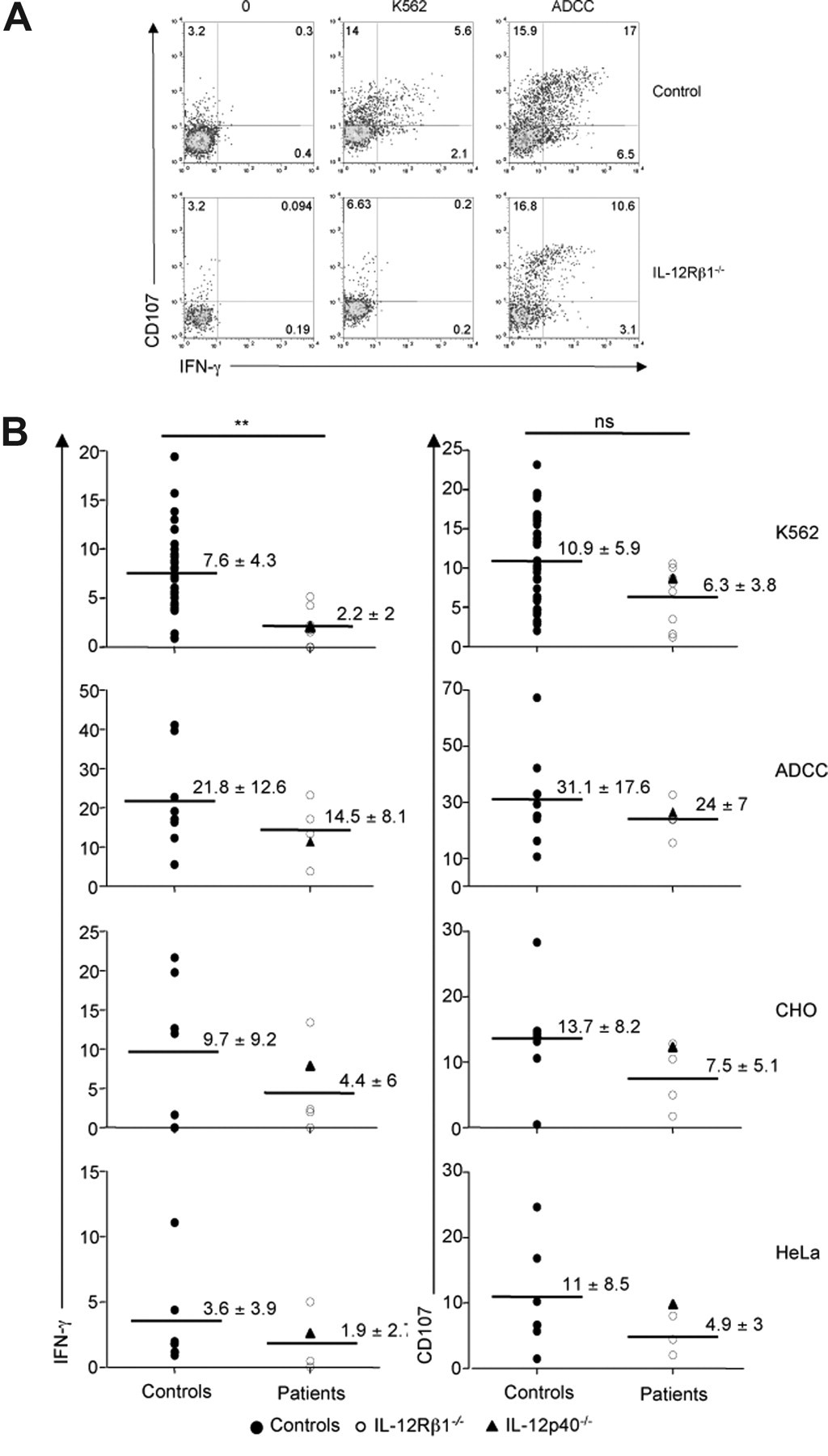
picture source:Guia S, et al. Blood. 2008
Mirjačić et al. investigated the effects of IL-12 and IL-18 on the function and receptor characteristics of NK cells and their subsets in patients with metastatic melanoma. The combination therapy of IL-12 and IL-18 in vitro can produce good effects on NK cell toxicity and CD25 receptor expression in patients with metastatic melanoma.
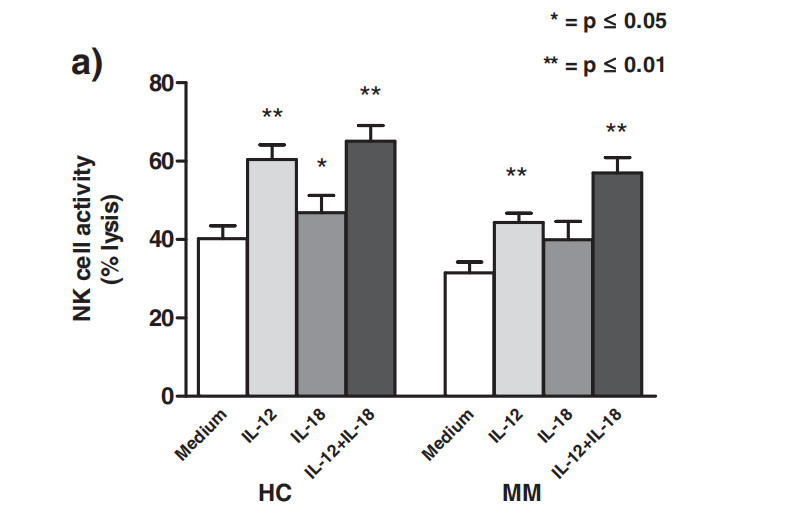
picture source:Mirjačić et al.. J Transl Med. 2015. PMID: 25889680.
Strengell M et al. also reported that the synergistic effect of IL-21 with IL-15 or IL-18 can enhance the production of IFN- γ in human NK and T cells, exerting cytotoxic effects.
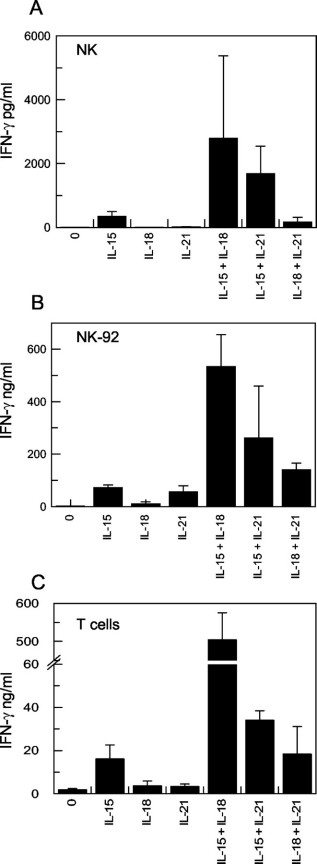
picture source:Strengell M, et al. J Immunol. 2003.
G&W Biotechnologie GmbH who is an international reagent supplier and technology service provider, focuses on the industry of cell and gene therapy (CGT).The products include Cytokines,Monoclonal antibodies,Cell separation magnetic beads,Serum-free medium,Cell culture kit etc.

